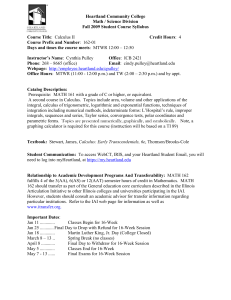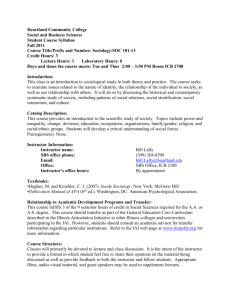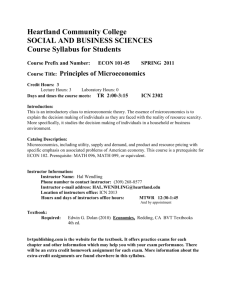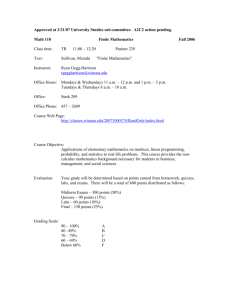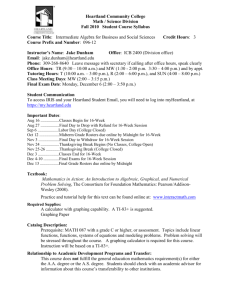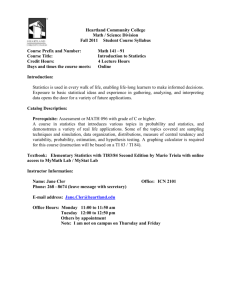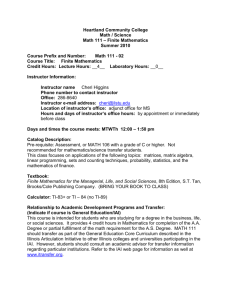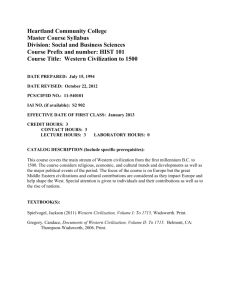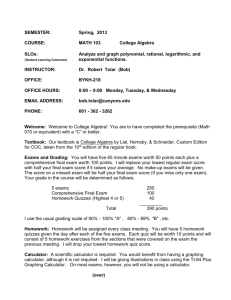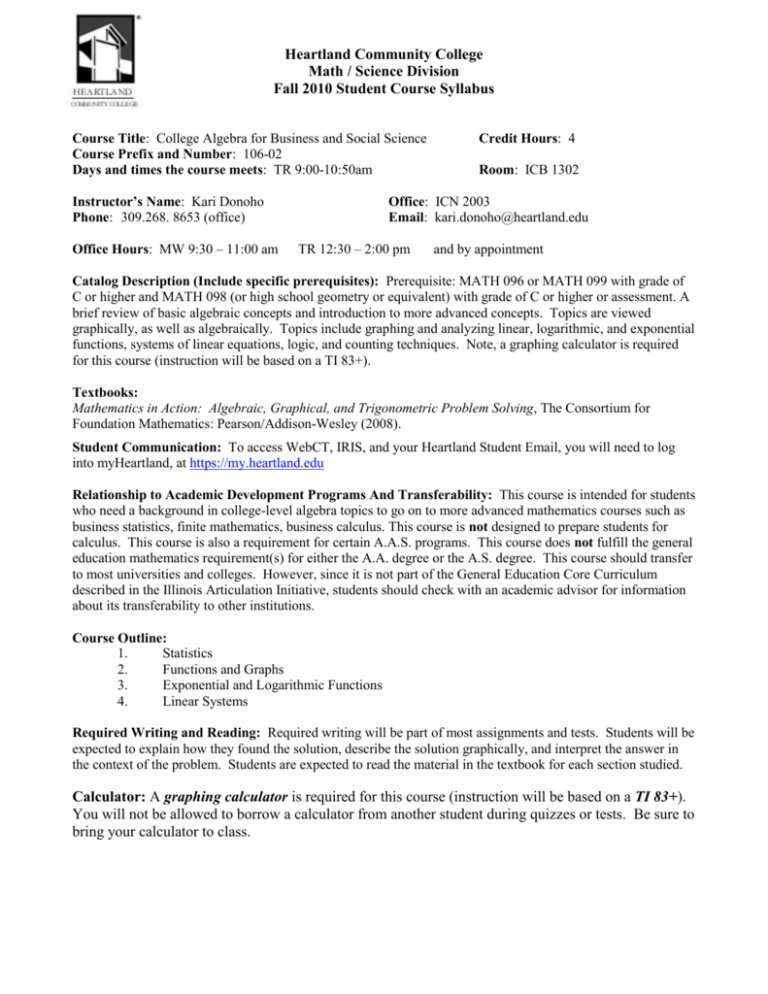
Heartland Community College
Math / Science Division
Fall 2010 Student Course Syllabus
Course Title: College Algebra for Business and Social Science
Course Prefix and Number: 106-02
Days and times the course meets: TR 9:00-10:50am
Instructor’s Name: Kari Donoho
Phone: 309.268. 8653 (office)
Office Hours: MW 9:30 – 11:00 am
Credit Hours: 4
Room: ICB 1302
Office: ICN 2003
Email: kari.donoho@heartland.edu
TR 12:30 – 2:00 pm
and by appointment
Catalog Description (Include specific prerequisites): Prerequisite: MATH 096 or MATH 099 with grade of
C or higher and MATH 098 (or high school geometry or equivalent) with grade of C or higher or assessment. A
brief review of basic algebraic concepts and introduction to more advanced concepts. Topics are viewed
graphically, as well as algebraically. Topics include graphing and analyzing linear, logarithmic, and exponential
functions, systems of linear equations, logic, and counting techniques. Note, a graphing calculator is required
for this course (instruction will be based on a TI 83+).
Textbooks:
Mathematics in Action: Algebraic, Graphical, and Trigonometric Problem Solving, The Consortium for
Foundation Mathematics: Pearson/Addison-Wesley (2008).
Student Communication: To access WebCT, IRIS, and your Heartland Student Email, you will need to log
into myHeartland, at https://my.heartland.edu
Relationship to Academic Development Programs And Transferability: This course is intended for students
who need a background in college-level algebra topics to go on to more advanced mathematics courses such as
business statistics, finite mathematics, business calculus. This course is not designed to prepare students for
calculus. This course is also a requirement for certain A.A.S. programs. This course does not fulfill the general
education mathematics requirement(s) for either the A.A. degree or the A.S. degree. This course should transfer
to most universities and colleges. However, since it is not part of the General Education Core Curriculum
described in the Illinois Articulation Initiative, students should check with an academic advisor for information
about its transferability to other institutions.
Course Outline:
1.
Statistics
2.
Functions and Graphs
3.
Exponential and Logarithmic Functions
4.
Linear Systems
Required Writing and Reading: Required writing will be part of most assignments and tests. Students will be
expected to explain how they found the solution, describe the solution graphically, and interpret the answer in
the context of the problem. Students are expected to read the material in the textbook for each section studied.
Calculator: A graphing calculator is required for this course (instruction will be based on a TI 83+).
You will not be allowed to borrow a calculator from another student during quizzes or tests. Be sure to
bring your calculator to class.
Course Objectives (Learning Outcomes):
After completing this course, the student should be able to:
Outcomes
Apply various techniques, including factoring, to
solve various types of equations: polynomial,
logarithmic, exponential, radical, rational, and
linear, and systems of linear equations.
Use problem solving strategies and above
techniques to solve application problems:
logarithmic, exponential, polynomial, linear and
systems of linear equations.
Apply rules for rational exponents
Define and graph linear , polynomial, rational,
radical, exponential, and logarithmic functions.
Determine the domain and range for various
types of functions.
Describe the relationship of a function to its
inverse and determine inverses algebraically and
graphically.
Be able to understand the relationship of a
function and its translations both graphically and
algebraically.
Use technology, including the use of graphing
technology to solve problems.
Understand the limitations of the use of
technology to solve problems.
General Education
Outcomes
PS 3, CT 3
Assessment
PS 3, CT 3, CO 1, CO 2,
CO 3, D1, D2
Quizzes, Homework,
Exams
PS 3
PS 3
Quizzes, Homework,
Exams
Quizzes, Homework,
Exams
Quizzes, Homework,
Exams
Quizzes, Homework,
Exams
Quizzes, Homework,
Exams
Quizzes, Homework,
Exams
Quizzes, Homework,
Exams
Quizzes, Homework,
Exams
Method of Evaluation (Tests/Exams, Grading System): Your course grade will be determined as follows,
100-90% = A, 89-80% = B, 79-70% = C, 69-60% = D, 59-0% = F. Methods of evaluation will consist of, but
are not limited to tests, quizzes, homework, and a final exam.
In Class Work /Homework
Quizzes
Unit Exams
Comprehensive Final Exam
10%
20%
50%
20%
**The percent score on your final exam will replace your lowest test percent score provided that your final is
not your lowest test score.
Late work policy: See instructor prior to an anticipated absence or contact instructor on the day of an
emergency absence in order to make arrangements for make-up work. There will be NO make-ups for exams,
quizzes or assignments if no contact is received from the student before the next class meeting.
Participation (or Attendance)
Regular attendance is not only expected, but is a must in order to be successful in this class. If a student is
absent, it is his/her responsibility to obtain class notes and assignments from someone in the class. Due to the
nature of this course and the fact that the group experience cannot be reproduced, HCC math faculty have
adopted this attendance policy for 106: Having more than 2 absences in any 3 consecutive weeks is grounds
for automatic withdrawal or receiving an F in the course.
Incompletes: An incomplete grade may be given to a student who, by the withdrawal date, can reasonably be
expected to pass the course. Incompletes may be granted only when justified by extreme circumstances (e.g.,
serious illness, accident, death or serious illness in the immediate family). Incomplete grades are not given for
such reasons as unjustified failure to appear for the final examination. A written agreement, outline the
requirements to be met, must be signed by the instructor and the student. The agreed upon requirements must be
completed no later than the end of the following semester. By the agreed upon date, the instructor will assign a
grade or the incomplete will be changed to an F if the requirements are not completed.
Student Conduct, Academic Integrity, Plagiarism: Students are expected to conduct themselves in a
courteous and responsible manner at all times. Please do not bring food/drink into the classroom.
Turn off cell phones during class. Do not talk to others while the instructor is talking to the class.
Please refer to the Student Conduct Policy in the Heartland Community College CATALOG for specific
policies concerning discipline, academic integrity and plagiarism.
Heartland Library Information http://www.heartland.edu/library
The Library, located in the Student Commons Building at the Raab Road campus, provides Heartland students
with a full range of resources including books, online journal databases, videos, newspapers, periodicals,
reserves, and interlibrary loan. Librarians are available to assist in locating information.
Tutoring Center:
http://www.heartland.edu/tutoring/index.jsp
(309) 268-8231
Testing Center:
http://www.heartland.edu/testing/index.jsp
(309) 268-8231
Academic Disabilities: If you have a documented disability and wish to discuss academic accommodations,
please contact Anita Moore at 268-8249 or anita.moore@heartland.edu.
Notice of Cancelled Class Sessions: Cancelled class sessions, for all HCC classes, will be listed under
Cancelled Class Meetings in the A-Z Index and under Academic Information in the Current Students page on
the HCC Web site. Go to http://www.heartland.edu/classCancellations/ to learn what classes have been
cancelled for that day and the upcoming week. Be sure to check the last column, which might contain a message
from the instructor.
Student Learning:
The present and future workplace has (and will have) an increased emphasis on flexibility and
adaptability to changes in technology, problem solving, critical thinking and the ability to work
cooperatively in groups. To this end, we will stress the following skills in addition to the
mathematical content of the course:
You will be able to construct a step-by-step approach to solving the problem;
You will be able to render a cogent explanation, understandable to other students of
approximately the same math level, of the purpose of each step that was taken toward the
result;
You will be able to justify your problem solving strategy;
You will be able to function independently and collaboratively within a group, to develop a
deeper understanding of problem solving techniques.
Instructor’s Role/Objectives:
Help students achieve their academic goals;
Deliver course content;
Provide a positive learning environment where students feel free to ask questions, feel free
to learn from mistakes, and are encouraged to develop their curiosity;
Help the students develop problem solving skills;
Provide guidance to students as they discover concepts and solutions;
Assist student groups in achieving the objectives of the individual lessons and the course –
primarily through the use of questioning;
Promote discussion within each group and with the entire class - primarily through the use
of questioning;
Clarify your understanding and increase your ability to communicate that understanding;
Model the deductive reasoning necessary for problem solving in mathematics.
Achieving Success in Learning Mathematics
Attend the lectures regularly.
Participate in class. Math is not a spectator sport. You need to be actively involved. Ask
questions if you don't understand a concept presented or need a point clarified. Work the
example problems presented in class.
Read the material in the textbook before class to have a general idea of what will be discussed.
Read the material again after the lecture for clarification and reinforcement of main ideas.
Review class notes and re-work class examples before starting homework assignment.
Do the homework in a timely manner. The lessons will continue to build on the previous class
meeting's material and if you have not completed that homework you will have trouble
understanding the new material.
Review the important terms and skills listed at the end of the chapter. Then work the review
exercises. Ask questions on any material that needs clarifying.
After the in-class exam is graded and returned to you, review the problems you missed. Ask
questions so you understand the mistakes that were made. Math keeps building on previously
learned skills. It is vital that you understand the skills just examined in order to understand the
next topic that will be discussed.
Important Dates:
Aug 16
Aug 27
Sep 6
Oct 12
Nov 3
Nov 24
Nov 24-26
Dec 3
Dec 6-10
Dec 9
Dec 13
Classes Begin for 16-Week
Final Day to Drop with Refund for 16-Week Session
Labor Day (College Closed)
Midterm Grade Rosters due by Midnight for 16-Week
Final Day to Withdraw for 16-Week Session
Thanksgiving Break Begins (No Classes, College Open)
Thanksgiving Break (College Closed)
Classes End for 16-Week
Final Exam Week for 16-Week Session
Final Exam from 8:00 am – 9:50 am
Final Grade Rosters due by Midnight for 16-Week
Tentative Day to Day schedule Fall 2010:
Week
No. Date
1
T 8-17
R
2
T 8-24
R
3
T 8-31
R
4
T 9-7
R
5
T 9-14
R
6
T 9-21
R
7
T 9-28
R
8
T 10-5
R
9
T 10-12
R
Section covered
Syllabus, 1.1, 1.2
1.3, 1.4, 1.5
1.6, 1.7, 1.9
1.10, 1.11
1.14, Ch 1 Review
Exam 1
2.1, 2.2
2.3, 2.4
2.5, 2.6
2.7, 2.8
2.9, Ch 2 Review
Exam 2
3.1
3.2, 3.3
3.4, 3.5
3.6, 3,8
3.9, 3.10
3.11, 3.12
Week
No.
Date
10
T 10-19
R
11
T 10-26
R
12
T 11-2
R
13
T 11-9
R
14
T 11-16
R
15
T 11-23
R
16
T 11-30
R
17
T 12-7
R
18
T 12-14
R
Section covered
3.13, Ch 3 Review
Exam 3
4.1
4.2, 4.3
4.4, 4.5
4.6, 4.8
4.9, 4.10
4.11, 4.12
4.13, Ch 4 Review
Exam 4
Rational Functions
Thanksgiving (No Classes)
Radical Functions
Final Exam Review
Final Exam 8:00 – 9:50 am
Syllabus is subject to change!
You are responsible to be in class to hear the changes!


